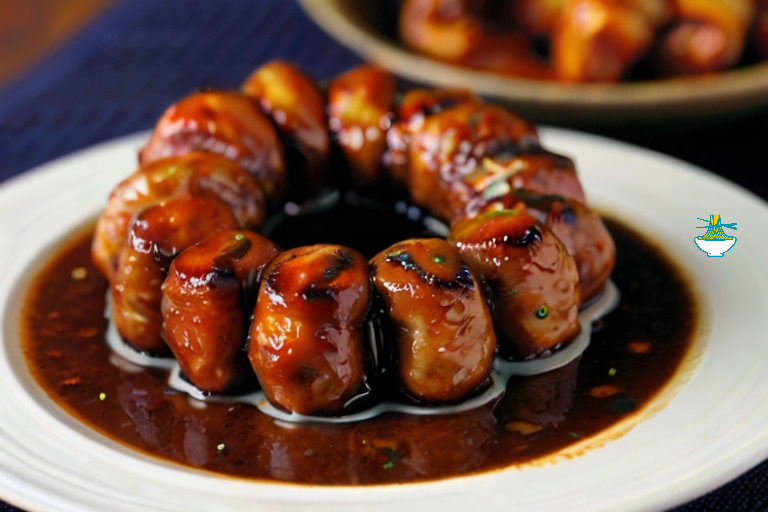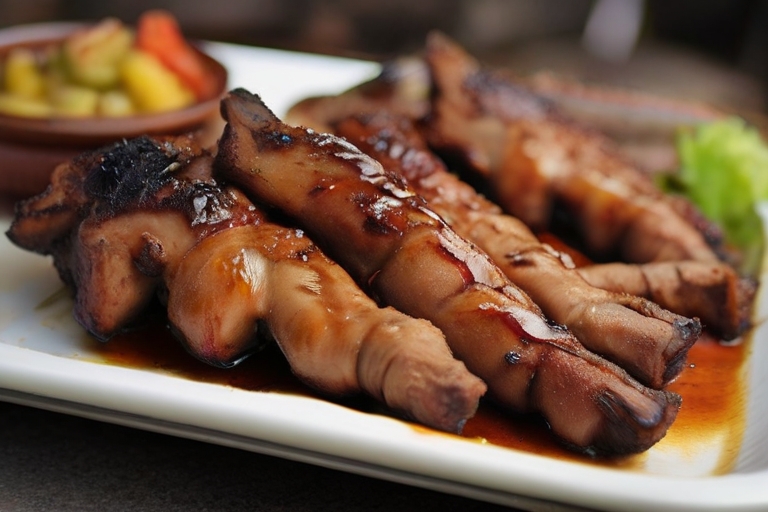Embark on a culinary journey to the vibrant island of Barbados with our mouthwatering barbecue pig tails recipe. This Caribbean delight captures the essence of Barbadian flavors, combining smoky, sweet, and savory notes to create a dish that's as rich in tradition as it is in taste. A popular choice for gatherings and celebrations, Barbados barbecue pig tails showcase the island's love for bold and distinctive flavors. Follow along as we guide you through the steps to recreate this culinary masterpiece, bringing a taste of the Caribbean to your kitchen. Get ready to elevate your barbecue skills and savor the irresistible allure of Barbadian cuisine!
Ingredients:
- 2 pounds pig tails
- 1 cup barbecue sauce
- 1/4 cup soy sauce
- 1/4 cup brown sugar
- 2 tablespoons Dijon mustard
- 2 tablespoons apple cider vinegar
- 2 cloves garlic, minced
- 1 teaspoon smoked paprika
- 1 teaspoon onion powder
- 1/2 teaspoon black pepper
- 1/2 teaspoon cayenne pepper (adjust to taste)
- 1/4 cup vegetable oil
- Wood chips for smoking (hickory or applewood recommended)
- Salt to taste

Instructions:
Prepare the Pig Tails:
1-Rinse the pig tails thoroughly under cold water. Pat them dry with paper towels.
2-Using a sharp knife, make several shallow cuts on each pig tail to help the flavors penetrate.
3-Season the pig tails with salt and set them aside while you prepare the marinade.
Make the Barbecue Marinade:In a bowl, combine the barbecue sauce, soy sauce, brown sugar, Dijon mustard, apple cider vinegar, minced garlic, smoked paprika, onion powder, black pepper, cayenne pepper, and vegetable oil. Whisk the ingredients until well combined.
Marinate the Pig Tails:
1-Place the pig tails in a large bowl or a resealable plastic bag.
2-Pour the barbecue marinade over the pig tails, ensuring they are well-coated. Massage the marinade into the cuts for better flavor penetration.
3-Seal the bowl or bag and refrigerate for at least 4 hours, or preferably overnight, to allow the flavors to infuse.
Prepare the Grill for Smoking:
1-Soak the wood chips in water for about 30 minutes.
2-Set up your grill for indirect grilling/smoking. If you have a smoker, even better.
3-Once the coals are hot, sprinkle the soaked wood chips over them to create smoke.
Smoke the Pig Tails:
1-Remove the pig tails from the marinade, letting excess marinade drip off.
2-Place the pig tails on the cooler side of the grill/smoker, away from direct heat.
3-Close the lid and smoke the pig tails for 2-3 hours or until they have a smoky flavor and are tender.
Grill the Pig Tails:
1-Preheat the grill to medium-high heat.
2-Transfer the smoked pig tails to the hot grill and brush them with additional barbecue sauce.
3-Grill for 10-15 minutes, turning occasionally, until the pig tails are caramelized and have a nice char.
Serve and Enjoy:
1-Remove the pig tails from the grill and let them rest for a few minutes.
2-Serve the Barbados Barbecue Pig Tails hot, garnished with chopped green onions or fresh herbs if desired.
Get ready to savor the irresistible combination of smoky, sweet, and savory flavors that make Barbadian Barbecue Pig Tails a true Caribbean street food delight!
Nutritional values
Nutritional values can vary based on specific brands and variations in ingredient sizes, but here's an approximate breakdown for the listed ingredients:
2 pounds pig tails:
- Calories: 2600 kcal
- Protein: 260g
- Fat: 160g
- Carbohydrates: 0g
- Fiber: 0g
- Sugars: 0g
benefits: Rich in protein and fat, pork tails add a succulent and flavorful element to the dish.
1 cup barbecue sauce:
- Calories: 200 kcal
- Protein: 0g
- Fat: 0g
- Carbohydrates: 50g
- Fiber: 0g
- Sugars: 40g
benefits: Adds a sweet, tangy, and smoky flavor, enhancing the overall taste of the dish.
1/4 cup soy sauce:
- Calories: 20 kcal
- Protein: 2g
- Fat: 0g
- Carbohydrates: 2g
- Fiber: 0g
- Sugars: 0g
benefits: Provides a salty and umami flavor, enhancing the savory profile of the marinade.
1/4 cup brown sugar:
- Calories: 220 kcal
- Protein: 0g
- Fat: 0g
- Carbohydrates: 56g
- Fiber: 0g
- Sugars: 56g
benefits: Contributes sweetness and helps caramelize the pig tails during grilling, adding depth to the flavor.
2 tablespoons Dijon mustard:
- Calories: 30 kcal
- Protein: 2g
- Fat: 2g
- Carbohydrates: 2g
- Fiber: 1g
- Sugars: 0g
benefits: Imparts a tangy and slightly spicy flavor, balancing the sweetness of other ingredients.
2 tablespoons apple cider vinegar:
- Calories: 0 kcal
- Protein: 0g
- Fat: 0g
- Carbohydrates: 0g
- Fiber: 0g
- Sugars: 0g
benefits: Adds acidity, which helps tenderize the meat and brightens the overall flavor.
2 cloves garlic, minced:
- Calories: 10 kcal
- Protein: 0g
- Fat: 0g
- Carbohydrates: 2g
- Fiber: 0g
- Sugars: 0g
benefits: Enhances the savory profile with a pungent and aromatic flavor.
1 teaspoon smoked paprika:
- Calories: 6 kcal
- Protein: 0g
- Fat: 0g
- Carbohydrates: 1g
- Fiber: 1g
- Sugars: 0g
benefits: Infuses a smoky and earthy undertone, contributing to the barbecue flavor.
1 teaspoon onion powder:
- Calories: 8 kcal
- Protein: 0g
- Fat: 0g
- Carbohydrates: 2g
- Fiber: 0g
- Sugars: 0g
benefits: Adds a mellow and sweet onion flavor, enhancing the overall seasoning.
1/2 teaspoon black pepper:
- Calories: 3 kcal
- Protein: 0g
- Fat: 0g
- Carbohydrates: 1g
- Fiber: 0g
- Sugars: 0g
benefits: Provides a mild heat and enhances the depth of flavor in the marinade.
1/2 teaspoon cayenne pepper (adjust to taste):
- Calories: 3 kcal
- Protein: 0g
- Fat: 0g
- Carbohydrates: 1g
- Fiber: 0g
- Sugars: 0g
benefits: Adds a kick of heat, allowing you to customize the spiciness of the dish.
1/4 cup vegetable oil:
- Calories: 480 kcal
- Protein: 0g
- Fat: 56g
- Carbohydrates: 0g
- Fiber: 0g
- Sugars: 0g
benefits: Adds moisture to the marinade, helps distribute flavors, and promotes a juicy texture during grilling.
Wood chips for smoking (hickory or applewood recommended):
- Negligible caloric content (used for flavoring)
benefits: Infuses a smoky aroma and flavor into the pig tails during the smoking process.
Salt to taste:
- Sodium content varies based on usage and personal preference.
benefits: Enhances the overall flavor by balancing sweetness and boosting other savory notes.
Please note that these values are estimates and can vary based on specific ingredients and quantities used in your preparation. Additionally, the values provided are per serving and the total values for the entire recipe will depend on the number of servings.


Comments